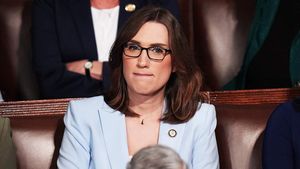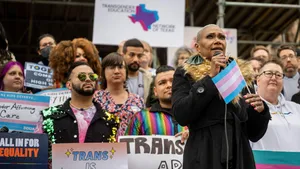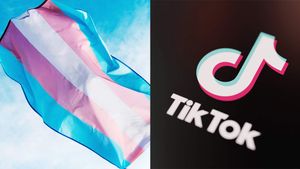
Treatment GuideJust DiagnosedSex & DatingAfrican AmericanStigmaAsk the HIV DocPrEP En EspañolNewsVoicesPrint IssueVideoOut 100
CONTACTCAREER OPPORTUNITIESADVERTISE WITH USPRIVACY POLICYPRIVACY PREFERENCESTERMS OF USELEGAL NOTICE
© 2025 Pride Publishing Inc.
All Rights reserved
All Rights reserved
By continuing to use our site, you agree to our Privacy Policy and Terms of Use.
Living with HIV for the past 20 years has not been easy. Right after receiving my diagnosis in 1985'a guaranteed death sentence in those days'I decided to break the news to my family. That was tough. Four years later I looked on helplessly while AIDS took my partner of nearly 10 years away from me. That was terrible. And twice since then the disease has brought me dangerously close to my own death. Thanks to my family, friends, doctors'and some powerful anti-HIV drugs'I am still here. But even in 2004 there is one challenge that never ends for me or for hundreds of thousands of other HIV-positive people: the responsibility to protect our partners from infection. There are more people living with HIV today than ever before. Most of us are having sex, which, I believe, is a good, life-affirming thing. Most of us with HIV take steps, such as using condoms, to keep our partners safe. But it is not easy to stay 100% safe 100% of the time'month after month, year after year'for the rest of our lives. To do that takes a lot of support'from our partners, our positive peers, our health care providers, and our communities. Unfortunately, we do not always get the support we need. For a variety of good reasons'competing needs and available resources among them'community-based HIV prevention programs have historically focused on safer-sex workshops and counseling that help uninfected people stay that way. Programs for HIV-positive people tend to concentrate on medical treatment options rather than on safer-sex strategies. Even among HIV physicians, this kind of support is lacking. Recent studies indicate that only about one in seven doctors will routinely counsel HIV-positive patients on how to avoid passing on the virus. And some doctors would rather not ask about the nitty-gritty of their patients' sexual behaviors, finding such talk impolite, irrelevant, or just plain uncomfortable. It is time to change this picture. Research shows that when people with HIV are counseled about safer behaviors, they are more likely to use condoms and reduce their number of sexual partners. 'Prevention for positives' is something that even the most time-stressed, sex-squeamish physicians can manage. Studies show that it takes only about four minutes for physicians to ask patients about their recent sexual history and counsel them about HIV risks. And training programs can help doctors become comfortable with talking to patients regarding sexual behavior. Community-based groups around the country are working with local health departments, the U.S. Centers for Disease Control and Prevention, doctors, nurses, and community educators to reach HIV-positive people with information about safer sex. The groups are helping them find ways to be responsible in their sex lives'without stigma, blame, or shame. Those of us living with HIV should not have to shoulder the entire burden of stopping the AIDS epidemic. But we need to do our part. We must be honest with our sex and needle-sharing partners about our status and ask about theirs before we get down to business. We must talk with our doctors when we need support to stay safe, even if they seem busy or uneasy. And we cannot wait for safer-sex programs to find us'we must look for resources in our communities that can provide the support we need. Two good places to start are the National Association of People With AIDS and the Black AIDS Institute. AIDS is everyone's problem, and all of us'positive and negative'need to be a part of the solution. By getting informed, getting tested, getting treated, and most important, getting involved, each of us can rise to the challenge. As someone who has had to deal with that challenge every day for almost two decades, I can tell you that every infection we prevent is cause for celebration. Wilson is the founder and executive director of the Black AIDS Institute.
From our Sponsors
Most Popular
BREAKING: Supreme Court rules to save free access to preventive care, including PrEP
June 27 2025 10:32 AM
Thanks to U=U, HIV-positive people can live long, happy, healthy lives
July 25 2025 2:37 PM
The Talk: Beyond the exam room
August 13 2025 3:15 PM
Plus: Featured Video
Latest Stories
Amazing People of 2025: Javier Muñoz
October 17 2025 7:35 PM
It’s National PrEP Day! Learn the latest about HIV prevention
October 10 2025 9:00 AM
“I am the steward of my ship”: John Gibson rewrites his HIV narrative
September 16 2025 2:56 PM
“So much life to live”: Eric Nieves on thriving with HIV
September 03 2025 11:37 AM
The Talk: Owning your voice
August 25 2025 8:16 PM
The lab coat just got queer
August 21 2025 10:00 AM
Messenger RNA could be the key to an HIV vaccine — but government cuts pose a threat
August 20 2025 8:02 AM
The Talk: Navigating your treatment
August 01 2025 6:02 PM
The Talk: Starting the conversation
July 25 2025 4:47 PM
How the Black AIDS Institute continues to fill in the gaps
July 25 2025 1:06 PM
“I felt like a butterfly”: Niko Flowers on reclaiming life with HIV
July 23 2025 12:22 PM
Dancer. Healer. Survivor. DéShaun Armbrister is all of the above
July 02 2025 8:23 PM
1985: the year the AIDS crisis finally broke through the silence
June 26 2025 11:24 AM
VIDEO: A man living with HIV discusses his journey to fatherhood
June 10 2025 4:58 PM
Trump admin guts $258 million in funding for HIV vaccine research
June 03 2025 3:47 PM
Grindr is reminding us why jockstraps are so sexy and iconic
May 02 2025 5:36 PM
HRC holds 'die-in' to protest Trump health care cuts
April 28 2025 2:11 PM
Two right-wing Supreme Court justices signal they may uphold access to PrEP and more
April 21 2025 4:10 PM


































































